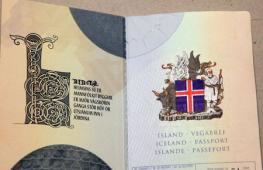System of Science and Higher Education of Iceland
Every twentieth student on the island of Geysers is a foreigner. This is a great achievement, taking into account the distance, climatic conditions and not better connection due to volcanoes. Nevertheless, those who recognize all the features of Icelandic universities will understand why they attract so much: although most of them are peculiar, they provide the world level of education.
Isle of geysers, of course, is not the best place for avid partyers.
Universities. Icelandic higher education is developing dynamically. Seven universities and four college-related college are already on the island, offering training in the specialties (from the energy and sea economy to vocals). In general, 18 thousand people are studying in them, about 5 percent of them are foreigners. Detailed training information can be found on the site. In Icelandic universities, estimates are applied from 0 to 10. Exams in most cases written. Students from Iceland have no test books, this role is performed in computers. Students do not receive credits to be admitted to the session. In many cases, the presence in classes is obligatory, and this serves as the basis for admission to the exam.
Requirements and documents for admission
 Dialing procedure and necessary documents. The main condition for admission to the university is the middle education certificate (here called Stúdentspróf), although it happens that students are being taken to study who their knowledge and skills in can prove in a different way (in consideration, in particular, professional experience, participation in volunteering and etc.). Admission procedures may differ depending on the university, but they usually look like at Reykjavik University: the university needs to provide a transfer of a certificate of secondary education with estimates, autobiography in Icelandic or English, as well as directions and a cover letter (up to 500 words) . Documents can be submitted personally or send scanned by email. If all the documents are in order, then you can expect invitations to the interview. Foreign students can be interviewed by phone or through the Skype program. If you have accepted - you must pay the registration fee. At Reykjavik University, it is 60 thousand. CZK. As happened everywhere in Europe, to get to study at the II degree, you must first get a bachelor's degree.
Dialing procedure and necessary documents. The main condition for admission to the university is the middle education certificate (here called Stúdentspróf), although it happens that students are being taken to study who their knowledge and skills in can prove in a different way (in consideration, in particular, professional experience, participation in volunteering and etc.). Admission procedures may differ depending on the university, but they usually look like at Reykjavik University: the university needs to provide a transfer of a certificate of secondary education with estimates, autobiography in Icelandic or English, as well as directions and a cover letter (up to 500 words) . Documents can be submitted personally or send scanned by email. If all the documents are in order, then you can expect invitations to the interview. Foreign students can be interviewed by phone or through the Skype program. If you have accepted - you must pay the registration fee. At Reykjavik University, it is 60 thousand. CZK. As happened everywhere in Europe, to get to study at the II degree, you must first get a bachelor's degree.
Date of submission of documents. The set for students from abroad begins pretty early - for example, at the University of Iceland, documents are accepted until December 5 (on the summer semester) and until April 30 (for a winter semester). In other universities, documents for a winter semester are usually accepted from March to June.
Exams. Exams need to be handed over to the schools of art. The remaining universities hold contests on the results of certificates of medium education or interview.
Language knowledge, certificates
Most classes are carried out in Icelandic. Foreigners, at the same time, can undergo special courses organized by the University or via the Internet at www.icelandic.hi.is. The list of directions with learning in English can be found at www.studyiniceland.is. There you can get, in particular, and certificates TOEFL and IELTS.
Residence
For entry into Iceland, enough personality certificate. As an EU citizen, you have the right to three-month stay at the hotel. If you are planning to stay for a longer period, you must contact foreigners (ISL. Útlendingastofnun, IDI) in Reykjavik for confirmation of the right to stay at the hotel. To do this, you will have to present the following documents: a copy of the passport, a certificate of study on study, the availability of residence, a statement on the availability of sufficient funds for maintenance (125540 kroons per month) and in the medical insurance card.
Also in Iceland, it is necessary to have an Icelandic personal identification number (Kennitala). It is used to confirm the person, for example, in the health care system, when writing to the university, in banks, and even when renting movies video. The room consists of 10 digits, the first 6 means birth dates (day, month, year). Foreigners cannot independently apply for the issuance of the identification number. Make it can employer or employment bureau. Details in the brochure prepared by the Icelandic Office of Eres. For more information on the procedure for obtaining a residence permit on IDI website.
Cost of learning and residence
Training fee. Part of the universities is paid, and some are free. For example, at the University of Iceland, students pay only a registration fee, which in 2012 amounted to 60 thousand crowns. University in Reykjavik for the year of studying the degree of bachelor requires 174 thousand crowns, and for the magistracy 348-407 thousand kroons (8800-10300 rubles).
Cost and accommodation conditions. Part of the universities offers places in hostels, although not enough for everyone. Detailed information on the university website: University of Akureyri, University Center at the Westfjords and Bifröst University. His student town also has the Keilir academic complex. To find accommodation in Reykjavik, you can use the employment agencies sites (for example, www.leigulistinn.is and www.studentamidlun.is) or use the services of the Student Accommodation Bureau (Byggingafélag Námsmanna). Prices for housing for students are different - on average, the room will have to pay 40-60 thousand crowns per month. The night in the hostel will cost 3100 kroons, a movie ticket, 1200 kroons, travel in Reykjavik 7700 CZK, liter of gasoline 250 kroons. In general, monthly accommodation on the island of Geysers can cost approximately. 140 thousand crowns.
student life
Iceland is not and will not be Mecca for students from around the world. More often, on the contrary, local residents leave to learn, for example, in Scandinavia. However, this does not mean that the Icelandic universities are not the impressive - computerization, infrastructure, organization - all of this, most Russian universities can envy. The training mode is not very tense, students can largely adjust their schedule as convenient for them. The island of geysers, of course, is not a place for avid party-finders - the climate is pretty severe, the habits of local residents too. But almost at every step, but you can meet the countryman - and feel at home. Scale of estimates used in Iceland reminds, for example, Dutch. Students receive estimates from 1 to 10, and ratings are considered not less than 5. The academic year lasts from September to May. Of the interesting facts: the largest Icelandic student town is located on the former US database in Keflaviku.



